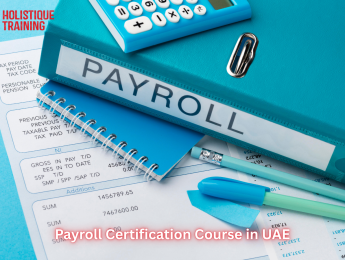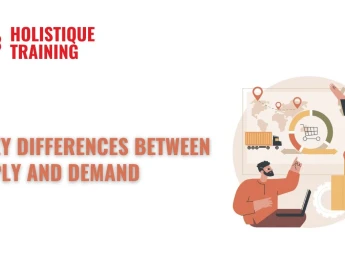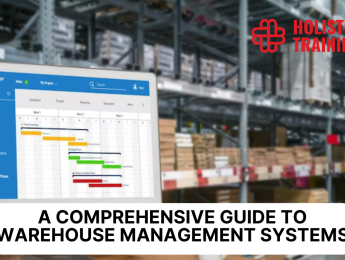- Table of Contents
- 1. Introduction:
- 2. What Is Payroll Management and Why It Matters
- Why does payroll management matter?
- Payroll management in the UAE involves tools and systems designed for this purpose:
- 3. Overview of Payroll Certification Courses in the UAE
- Certification Options
- Who should enrol?
- 4. Key Learning Objectives and Competencies Gained
- Understanding payroll cycles and structure
- Applying UAE labour laws to payroll processing
- Managing WPS files and SIF generation
- Calculating gratuity and deductions accurately
- Maintaining data confidentiality and ethical payroll management
- Using payroll software effectively
- Preparing payroll reports for management and audit
- 5. The Legal Framework: UAE Labour Law and Wage Protection System (WPS)
- Legal importance of payroll accuracy
- Overview of Federal Decree-Law No. 33 of 2021
- Wage Protection System (WPS)
- Linking certification training to compliance readiness
- Courses include WPS file formatting, salary transfers and audit preparation
- 6. Types of Payroll Certification Courses in the UAE
- Short-term Professional Certificates (1-2 weeks)
- Advanced Payroll Management Diplomas (1-3 months)
- Specialised Software Certifications
- Comparison Table: Duration, Format & Eligibility
- Additional Consideration
- 7. Benefits of Getting Payroll Certified in the UAE
- Improved employability and salary potential
- Compliance confidence with UAE laws
- Enhanced credibility in HR or accounting roles
- Increased efficiency using automation tools
- Career advancement: HR Payroll Officer → Payroll Manager → HR Director
- Recognition by employers
- 8. Career Opportunities After Payroll Certification
- Job titles
- Industries hiring
- Salary ranges
- Freelance and consultancy opportunities
- 9. How to Choose the Right Payroll Certification Course in the UAE
- Accreditation and recognition
- Practical training focus (case studies, WPS simulations)
- Flexibility (online/live/hybrid)
- Course reviews and trainer qualifications
- Cost vs ROI (return on investment)
- Mini-checklist: What to ask before enrolling
- 10. Future Trends in Payroll and HR in the UAE
- Digital transformation: cloud-based payroll and AI analytics
- Remote work and multi-country payroll solutions
- Integration of payroll with ESG reporting and employee wellbeing
- Role of HR analytics and data security
- 11. Conclusion:
1. Introduction:
In a nation where every payslip must comply with strict legal frameworks, certified payroll professionals have become indispensable. The United Arab Emirates (UAE) has undergone a rapid transformation of its economy and employment landscape, fuelled by massive investment, a liberalised business environment, and strategic initiatives such as Emiratisation (the drive to increase Emirati nationals in employment) and the implementation of Value-Added Tax (VAT). These changes have significantly elevated the importance of payroll management and compliance in the region.
For companies operating in the UAE, payroll is not simply a matter of paying salaries on time. It involves navigating the complex terrain of the UAE’s labour laws, the Wage Protection System (WPS) regulated by the Ministry of Human Resources & Emiratisation (MoHRE), end-of-service benefits (gratuity), allowances, deductions, and regulatory filings. As the labour market matures, with both local and international firms setting up or expanding operations in Dubai, Abu Dhabi and across the Emirates, the demand for payroll ‐ savvy professionals has grown. Employers now value more than basic spreadsheet skills; they want individuals who understand local regulation, can use payroll software, manage cross-border issues, and ensure compliance.
Consequently, Payroll Certification Courses are emerging as a vital route for HR professionals, accountants and payroll staff alike to master those systems. These courses provide structured training in payroll processing, legislation, systems, and compliance — something that simply picking up the task on-the-job may not guarantee. Whether you are an HR assistant wanting to specialise in payroll, an accountant tasked with payroll oversight, or an entrepreneur wanting to ensure your small business meets UAE payroll obligations, obtaining the right certification can provide a competitive edge.
In the UAE’s dynamic business ecosystem, where regulatory frameworks are updated regularly and payroll errors can carry reputational and financial risk, investing in certification is not just beneficial — it is fast becoming essential. In the following sections we explore what payroll management means in the UAE context, how certification courses are structured, the learning objectives, the legal framework, the different types of courses, the benefits, career opportunities, how to choose the right course, future trends, and wrap with a conclusion on building a future-ready payroll career.
2. What Is Payroll Management and Why It Matters
Payroll management refers broadly to the process by which organisations calculate and disburse employee salaries and wages, apply the relevant deductions and benefits, comply with internal and legal obligations, and finally report or reconcile the results. In the UAE context this includes tasks such as determining gross pay, calculating allowances (for housing, transport, etc.), handling overtime and leave, applying gratuity/end-of-service calculations, managing statutory deductions, and ensuring payment via approved channels (such as WPS).
Why does payroll management matter?
At its core, it ensures accurate compensation for employees, which is foundational to both employee satisfaction and organisational credibility. Errors in payroll — whether late payment, incorrect deductions or non-compliance with regulation — can create legal exposure, damage employee morale, invite regulatory fines and undermine organisational reputation. Payroll sits at the intersection of accounting and human resources: from the accounting side it forms part of the cost ledger, tax and audit trail; from the HR side it impacts employee retention, trust, communication and benefits administration.
Payroll management in the UAE involves tools and systems designed for this purpose:
Software such as SAP Payroll, Oracle HCM Payroll, Zoho Payroll, QuickBooks Payroll and custom in-house or outsourced platforms. These systems help automate payroll cycles, minimise errors, ensure regulatory compliance, generate reports and integrate payroll with HR and finance functions. By linking payroll with HR metrics (head-count, leave, overtime) and accounting systems (general ledger, cost centres, tax accruals), organisations build a holistic view of workforce cost and control.
In short: payroll management is not a routine administrative task — it is a strategic business function. In the UAE’s context, given its regulatory rigour, expatriate workforce, multi-emirate operations and evolving labour legislation, robust payroll management becomes doubly critical. This sets the stage for why payroll certification courses are gaining traction — they provide the structured training to handle the complexity, integrate the tools and apply the legal frameworks effectively.
3. Overview of Payroll Certification Courses in the UAE
What exactly do payroll certification courses in the UAE cover, and what options are available? At a broad level, a payroll certification course encompasses:
- Payroll systems and tools: training on payroll software, calculation engines, automation, input and output formats.
- Labour laws: understanding legislation governing employment relationships, wages, contracts, fixed-term vs unlimited term, leaves, termination and end-of-service benefits.
- WPS compliance: navigating the Wage Protection System, salary payments via approved channels, updating employee data, handling late payments and fines.
- Leave policies and overtime: applying annual leave, sick leave, public holidays, overtime calculations and allowances as stipulated by law.
- End-of-service benefits/gratuity: calculating gratuity entitlements, service duration, basic wage basis, and payouts upon termination or resignation.
- Taxation and accounting fundamentals: although the UAE has no personal income tax (in most cases), payroll professionals must understand payroll cost accounting, social security (where applicable), VAT implications for allowances/benefits, payroll accruals and reporting to auditors.
Certification Options
In the UAE you can typically find several kinds of payroll certification courses:
Holistique Training Payroll Certification
offered by an HR/training specialist provider in the UAE, designed to give learners a structured pathway through payroll theory and practice.
CIPD-Recognised Payroll Courses
for HR professionals seeking broader HR qualifications with a payroll specialism.
IFRS-based Payroll Accounting Courses
for those in finance roles focusing on how payroll fits into financial reporting and audit.
UAE MoHRE-compliance training programmes
focusing specifically on legal/regulatory updates for payroll and WPS in the UAE.
These courses vary in duration, delivery mode and accreditation. Some are 1-2 week short courses (mainly introductory), others are 1-3 month diplomas with hands-on software training and case studies. Delivery may be online, onsite/in-class or hybrid (combination of online lectures + in-person workshops). Accreditation might be internal (by the training provider), industry-recognised (HR professional bodies) or linked to continuing professional development (though you requested not to mention any CPD accreditation in our case).
Who should enrol?
- HR assistants or coordinators who want to specialise in payroll.
- Accounting professionals transitioning into payroll oversight or payroll cost control.
- Payroll administrators seeking formal certification for career advancement.
- Entrepreneurs or small business owners in the UAE who manage payroll internally and want to ensure compliance.
- HR/generalists in multinational companies operating in the UAE who need to align payroll with multi-country operations.
In short, a payroll certification course in the UAE provides an essential stepping stone for anyone who wants to be proficient in one of the most critical administrative and compliance functions of an organisation.
4. Key Learning Objectives and Competencies Gained
When you enrol in a payroll certification course in the UAE, you should come away with a set of clear learning objectives and competencies — not just theoretical knowledge but practical skills you can apply immediately.
Understanding payroll cycles and structure
A payroll certification course will start by mapping the full payroll cycle — from data collection (timesheets, allowances, overtime) to gross pay calculation, deductions, net pay, transfer to bank accounts and post-payment reconciliation. Knowing how each element fits together enables you to manage the process end-to-end and anticipate bottlenecks (for example, late submission of timesheets or missing employee data).
Applying UAE labour laws to payroll processing
The UAE’s labour regime (see section 5) has specific provisions around contracts, leave, overtime, termination, end-of-service benefits and wage payments. A certified professional will know how to translate those legal requirements into payroll entries (e.g., converting working days into leave deductions, calculating gratuity for 1-5 years service, determining fixed-term contract durations). This alignment between law and payroll ensures the organisation remains compliant.
Managing WPS files and SIF generation
The Wage Protection System is a mandatory platform for payroll payment in many UAE businesses. Courses will train participants how to prepare and upload Salary Information Files (SIF), how to resolve mismatches (wrong bank account, missing employee ID), and what to do if payments are delayed or rejected. This operational competence significantly reduces risk of fines.
Calculating gratuity and deductions accurately
One area of frequent payroll error is the end-of-service gratuity: how many days per year of service, basic wage definition, deduction for leave payout, etc. A certification course will walk through scenarios, formulae and case studies so you can confidently compute gratuity, termination-pay entitlements and deduction logic.
Maintaining data confidentiality and ethical payroll management
Payroll data is sensitive: salary amounts, benefits, personal data. The course will cover good practices around data protection, audit trails, segregation of duties (when payroll is outsourced), and how to communicate with employees about payroll queries. This builds your reputation as a trustworthy specialist.
Using payroll software effectively
Training typically includes hands-on modules with payroll software. You’ll learn how to input data, configure allowances and deductions, generate payslips, export to bank or WPS, run reports and integrate with HR/finance systems. This technological capability is increasingly expected in employers.
Preparing payroll reports for management and audit
Finally, the best courses teach you not just how to pay staff but how to present data: cost per employee, overtime trends, payroll headcount, forecasting payroll cost increases. Producing meaningful reports enhances your value to senior management and strengthens your career trajectory into roles such as Payroll Manager or HR Operations Specialist.
Together, these competencies make certification more than a box-tick exercise; they form the foundation of a professional payroll career in a complex environment like the UAE.
Below is a table summarising key competencies, their application and career impact.
Table 1:
Skill | Application | Career Impact |
Understanding payroll cycles and structure | Implementing monthly/bi-monthly payroll processes, setting up salary timelines | Enables you to take full ownership of payroll operations |
Applying UAE labour laws to payroll processing | Interpreting employment contracts, leave entitlements, gratuity, fixed-term vs unlimited | Reduces legal risk, boosts credibility as compliance-capable professional |
Managing WPS files and SIF generation | Creating salary files, uploading to WPS, troubleshooting salary transfer issues | Leads to smoother payroll processing, fewer penalties |
Calculating gratuity and deductions accurately | Applying correct formulae for end-of-service benefits, deductions for leave or absence | Builds trust with employees and employers, strengthens financial accuracy |
Maintaining data confidentiality and ethical payroll management | Ensuring payroll data security, abiding by data-protection best practices | Positions you as a trusted payroll specialist |
Using payroll software effectively | Operating payroll modules (e.g., SAP Payroll, Zoho, QuickBooks), generating reports | Makes you dependable in tech-enabled environments |
Preparing payroll reports for management and audit | Producing payroll cost summaries, audit trails, analytics | Elevates your role from operator to advisor in HR/finance decisions |
5. The Legal Framework: UAE Labour Law and Wage Protection System (WPS)
Payroll professionals in the UAE must operate within a robust legal framework — understanding it is non-negotiable.
Legal importance of payroll accuracy
Incorrect payroll processing — late payments, incorrect deductions or miscalculated end-of-service benefits — can expose companies to regulatory penalties, employee claims and reputational damage. For example, under the law the employer must ensure wages are paid on due dates in an agreed currency and method. Payroll certification courses often emphasise the legal implications of non-compliance — making accurate payroll a compliance as well as operational priority.
Overview of Federal Decree-Law No. 33 of 2021
In the private sector, the key legislation is Federal Decree‑Law No. 33 of 2021 on the Regulation of Employment Relationships (the “New Labour Law”), which came into effect on 2 February 2022 and supercedes Federal Law No. 8 of 1980. Among its many provisions relevant to payroll: employment contracts must be fixed-term (up to three years) in most cases. Article 22 requires that the amount/type of wage must be specified in the contract. These legal changes mean that payroll workflows must be updated — for example payroll professionals need to verify contract type, wage base, allowances, leave entitlements per the new law’s definitions.
Wage Protection System (WPS)
The WPS is an electronic salary-transfer system mandated by MoHRE (in cooperation with the Central Bank). It ensures that private-sector employees are paid on time through approved banks or financial institutions. For payroll professionals, the WPS means: preparing the Salary Information File (SIF) in the correct format, ensuring employee bank accounts are registered, submitting payments before deadlines, dealing with rejected transactions and understanding the implications of late or incorrect payments. Non-compliance may incur fines and sanctions. Certification training often includes modules on WPS registration, salary upload procedures, troubleshooting errors and ensuring audit-ready records.
Linking certification training to compliance readiness
A key benefit of enrolling in a payroll certification course in the UAE is that it equips you with the legal and practical frameworks to ensure payroll compliance. You learn to interpret the New Labour Law, apply WPS processes, maintain records in accordance with Article 36 of Decree-Law 33 (which requires employee files be kept for at least two years) and produce payroll reports that stand up in audits. Without this training, payroll professionals may struggle to keep up with regulatory updates and the intricacies of UAE-specific payroll demands.
Courses include WPS file formatting, salary transfers and audit preparation
Leading payroll certification programmes embed practical workshops: how to create SIF files, how to set up the payroll in the banking portal, how to report to MoHRE, what records to keep for audit, how to handle employee queries or disputes, how to implement and document deductions, allowances and gratuity calculations. These hands-on elements convert theoretical knowledge into workplace-ready capability.
In summary, the legal landscape in the UAE places a heavy burden on payroll professionals. Certification training helps you turn that burden into professional advantage — positioning you as a specialist who can manage payroll accurately, compliantly and strategically.
6. Types of Payroll Certification Courses in the UAE
There is no “one-size-fits-all” when it comes to payroll certification in the UAE. Depending on your role, career stage and learning preference, you’ll find several types of courses. Below are the common types:
Short-term Professional Certificates (1-2 weeks)
These are ideal for HR assistants or payroll beginners. They cover foundational topics such as payroll terminology, calculations, gross/net pay, allowances and deductions, introduction to WPS, and basic use of payroll software. They are often delivered as workshops or online modules that can be completed over a few days.
Advanced Payroll Management Diplomas (1-3 months)
For mid-level HR or finance staff, these programmes go deeper into subjects such as UAE labour law, detailed gratuity/end-of-service benefit calculation, payroll reconciliation, audit controls, multi-entity/multi-emirate payroll, advanced software integration and analytics. They may include case studies, software labs and assessment projects.
Specialised Software Certifications
Many organisations train employees specifically on payroll modules of SAP, Oracle, Zoho, QuickBooks or region-specific platforms. These courses often assume you have payroll fundamentals and focus instead on system configuration, report design, automation, integrations with HR/finance modules, and multi-jurisdiction payroll capabilities.
Comparison Table: Duration, Format & Eligibility
Course Type | Duration | Format | Eligibility |
Short-term Professional Certificate | 1–2 weeks | Online, classroom or hybrid | HR assistants, new payroll admins |
Advanced Payroll Management Diploma | 1–3 months | Blended (online + workshops) | Payroll co-ordinators, accountants, HR generalists |
Specialised Software Certification | 2–4 weeks (software module) | Instructor-led software lab | Existing payroll users or those moving to system specialist role |
Additional Consideration
- Some courses may include online self-paced modules, enabling busy professionals to learn at their own speed. For example, one provider offers “Payroll Training Level 1 Certificate – Dubai online” with self-paced options.
- Others may feature corporate/private training tailored to the organisation’s payroll systems and sector-specific needs (e.g., construction, hospitality, free-zone companies).
- Some training providers emphasise region-specific content, recognising that Middle East payroll has its own unique requirements (as one MENA payroll academy states : “developed for the Middle East” and “work-based learning … region-specific”).
Selecting the type of course depends on your current experience, the role you are in or aspire to, the size and complexity of your payroll environment, and your preferred learning mode. The right certification can accelerate your career by equipping you with both the knowledge and the credentials that employers look for.
7. Benefits of Getting Payroll Certified in the UAE
Enrolling in a payroll certification course in the UAE delivers multiple benefits — from employability upgrades to enhanced professional confidence.
Improved employability and salary potential
Certified payroll professionals are increasingly valuable to employers in the UAE because they bring documented competence in both payroll operations and regulatory compliance. Holding a certification signals to recruiters and managers that you understand the end-to-end payroll lifecycle, local legislation, and can work with payroll software. That can translate into higher starting salaries and faster promotion.
Compliance confidence with UAE laws
Payroll certification ensures you are up to date with the latest legislation such as the New Labour Law, WPS requirements and best practice payroll policies. This reduces the risk of penalties, employee disputes or audit findings for your organisation — and increases your value as a professional who can safeguard the employer’s interests.
Enhanced credibility in HR or accounting roles
Whether you are an HR generalist who wants to specialise in payroll, or an accountant moving into payroll oversight, certification gives you a credible credential and demonstrates your commitment to professional development. Employers appreciate staff who take the initiative to formalise their knowledge and training.
Increased efficiency using automation tools
Modern payroll functions rely heavily on software and process automation. A payroll certification course typically covers software usage, payroll reporting and analytics, enabling you to work more efficiently, reduce manual errors and drive better decision-making.
Career advancement: HR Payroll Officer → Payroll Manager → HR Director
The pathway from payroll operator to payroll manager to senior HR role is clearer when you have certification. Employers tend to look favourably on candidates who combine technical payroll competence with strategic insight (e.g., cost forecasting, head-count planning, analytics). With certification you position yourself for roles such as “Payroll Manager”, “HR Operations Lead” or “Shared Services Payroll Director”.
Recognition by employers
Multinational companies, banks, large hospitality groups and contractors in the UAE often require or prefer certified payroll professionals due to the complexity of managing expatriate payrolls, multiple benefit schemes and compliance with MoHRE and free-zone regulations. For example, training providers in Dubai highlight that their “Payroll Course in Dubai” is trusted across 190+ countries and addresses business needs.
In summary, payroll certification in the UAE is not just a nice-to-have. It is a strategic investment in your career that can pay dividends in terms of job opportunities, professional credibility, operational efficiency and compliance resilience.
8. Career Opportunities After Payroll Certification
Completing a payroll certification course opens a variety of career pathways in HR, finance and operations. Here are key roles, industries and salary insights.
Job titles
- Payroll Officer
- Payroll Accountant
- HR Executive (Payroll & Benefits)
- HR Operations Specialist
- Payroll Manager
- Shared Services Payroll Lead
- Payroll Consultant (freelance)
Industries hiring
Payroll skills are valued across sectors, especially where large workforces or expatriate staff are present: construction, manufacturing, healthcare, retail, hospitality, government contracting, financial services and free-zone companies. The UAE’s diverse economy means skilled payroll professionals are in demand across many verticals.
Salary ranges
Although salaries vary by experience, company size, industry and Emirate, the payroll profession in the UAE commands competitive compensation. Below is a short-table summary (estimated AED/month) to provide a guide:
Job Title | Experience Level | Average Monthly Salary (AED) |
Payroll Officer | 1-3 years | 8,000 – 12,000 |
Payroll Accountant | 3-5 years | 12,000 – 18,000 |
Payroll Manager | 5-10 years | 18,000 – 30,000+ |
Payroll Consultant | Freelance/Contract | Varies widely (project-based) |
(Please note: These are indicative ranges; actual salary may differ depending on location, employer, benefits and complexity of payroll managed.)
Freelance and consultancy opportunities
With certification, you also open the door to payroll outsourcing, freelance consultancy or project work. Many SMEs in the UAE outsource payroll or engage external specialists for compliance audits or software implementations. A certified payroll professional can position themselves as an adviser, trainer or contractor in this niche.
Overall, payroll certification gives you a competitive edge in a payroll-centric job market in the UAE — enabling you to move beyond routine payroll tasks into higher-value roles with strategic insight, compliance leadership and technical skill.
9. How to Choose the Right Payroll Certification Course in the UAE
Selecting the right payroll certification course involves careful evaluation of several critical factors:
Accreditation and recognition
Ensure the course is delivered by a reputable provider, with recognised credentials (industry associations, HR/finance institutions). While not all payroll courses carry formal accreditation, look for certificates that carry weight in the job market.
Practical training focus (case studies, WPS simulations)
The best courses do more than lecture — they include real-world case studies, group exercises, payroll software labs, WPS simulation, and perhaps a final project or assessment. Check the syllabus to ensure you will practise tasks you’ll actually perform in the job.
Flexibility (online/live/hybrid)
If you are working full-time, flexibility matters. Look for courses that offer online modules, live virtual sessions, recorded lectures, or hybrid models combining online and in-person workshops. The “Payroll Training Level 1 Certificate – Dubai online” programme is one example with self-paced options. lsib.ae
Course reviews and trainer qualifications
Investigate the provider’s track record. Are their trainers experienced payroll professionals in the UAE region? Are there testimonials or reviews from past learners? A provider that offers post-course support (e.g., job placement, Q&A access) adds value.
Cost vs ROI (return on investment)
Training costs vary widely. Consider how much you will pay versus how much your salary or role could increase post-certification. Also factor in additional benefits: access to software, networking with peers, membership of payroll forums or communities.
Mini-checklist: What to ask before enrolling
- What is the duration and format of the course?
- Does the course content cover UAE-specific payroll (WPS, gratuity, free-zone complexities)?
- Is there hands-on use of payroll software?
- What certificate is awarded? Is it recognised by employers?
- Are there pre-requisites or assumed knowledge?
- Will I receive ongoing support or access after the course?
- What is the refund or deferral policy?
- Are there alumni testimonials or job placement statistics?
By approaching your course choice with these questions in mind, you ensure you enrol into a training programme that not only adds a certificate to your CV but genuinely advances your payroll competence and career.
10. Future Trends in Payroll and HR in the UAE
As payroll evolves globally, the UAE is keeping pace — and payroll professionals must adapt to stay ahead. Here are key trends shaping payroll and HR in the UAE.
Digital transformation: cloud-based payroll and AI analytics
Payroll is moving from on-premises systems and manual spreadsheets to cloud-based payroll platforms that integrate HR, finance and analytics. Artificial intelligence (AI) is being used to detect payroll anomalies, predict overtime or attrition cost, and automate payslip queries. Certified payroll professionals will need to understand how to leverage these tools for efficiency and insight.
Remote work and multi-country payroll solutions
With hybrid and remote work on the rise, many UAE-based companies are managing payroll across multiple jurisdictions and time-zones. Payroll professionals will increasingly need to understand cross-border payroll, taxation (where applicable), social security, and how to integrate global payroll data.
Integration of payroll with ESG reporting and employee wellbeing
Payroll data is becoming a strategic asset: linking it to employee cost, turnover, diversity metrics, wage equity, and ESG (environmental, social, governance) reporting. Payroll professionals will play a key role in providing data for ESG disclosures (e.g., gender pay gap, living wage compliance).
Role of HR analytics and data security
The volume of payroll data is increasing, and with that the risk of data breaches. Payroll professionals must be conversant in data governance, security best practices, and analytics dashboards that reveal trends such as paid leave utilisation, overtime spikes or cost leakage.
In this evolving landscape, a payroll certification course that includes modules on digital tools, global payroll, analytics and emerging trends will give you a forward-looking edge. Being certified is no longer just about doing payroll correctly — it’s about doing it smartly, strategically and compliantly in a future-facing business environment.
11. Conclusion:
In the dynamic business ecosystem of the UAE, where every payslip must align with regulatory frameworks and every employee count towards operational cost, payroll management stands as a key function — not just for HR or finance, but for the entire organisation. A payroll certification course offers a structured pathway to mastering this vital area: from understanding payroll systems and labour laws, to navigating the WPS, using the latest payroll software, producing insightful reports and aligning your skills with evolving trends.
As we have explored, certification brings numerous benefits: improved employability, higher salary potential, credibility within organisations, greater operational efficiency and upward career mobility. The career opportunities span from payroll officer to manager and beyond, across sectors such as construction, hospitality, finance and multinational enterprises. Choosing the right course involves careful evaluation of accreditation, practical training content, flexibility, cost and ROI — and positioning yourself for success in a changing world of payroll.
Looking ahead, payroll in the UAE will continue to evolve: from cloud platforms and AI, to global payroll operations, from ESG reporting to big data analytics and tighter regulatory oversight. Certified professionals who stay current will not only survive but thrive. Remember: payroll isn’t just about numbers — it’s about trust, compliance, professionalism and serving the critical function of making sure employees are paid accurately, on time, every time.
If you’re ready to take the next step and make payroll your specialism — your future awaits.























